Mortal Kombat: Deception
Apparently it's good. But can you trust that?
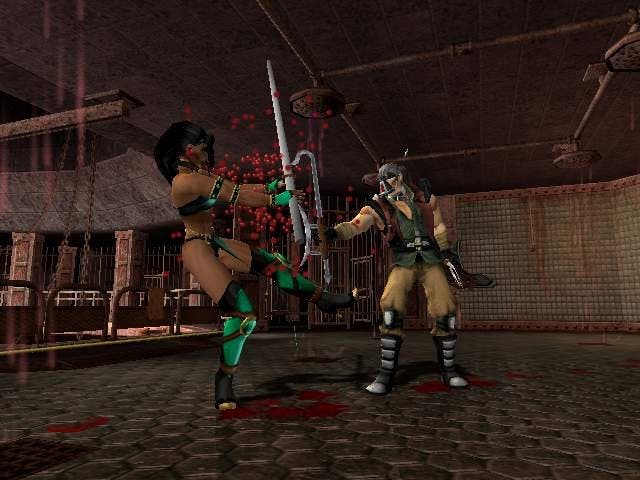
This game has the best-fitting title of the year. It wasn't meant that way, but it's appropriate nonetheless.
You see, the Mortal Kombat series has always involved deception of some sort. When the first game was released in arcades, its success was based on a disguise of kinds. We were all so blown away by the game's excellent graphics and addictive gore that, initially at least, we overlooked the fairly clunky gameplay. The question is: would Mortal Kombat have been so popular without the violence? If it had been called Mortal Wombat and starred fluffy Australian animals instead, would the gameplay have made it just as successful? I have my doubts.
The fact is, the series flattered to deceive after the release of its first two games. This fall from grace arguably culminated with the atrocious Mortal Kombat: Special Forces, which was more disturbing than any fatality Kano and co. had produced up until then.
But everything changed with last year's Deadly Alliance, the first proper reworking of the Kombat gameplay for a modern context. It may not have been as sophisticated as Virtua Fighter 4 and Soul Calibur II, but it did earn the right to comparisons at least. The irony was that many people were again deceived by the Mortal Kombat façade - this time turned away by what they presumed was just another gore fest.
A, B, K, D, E, F, G...
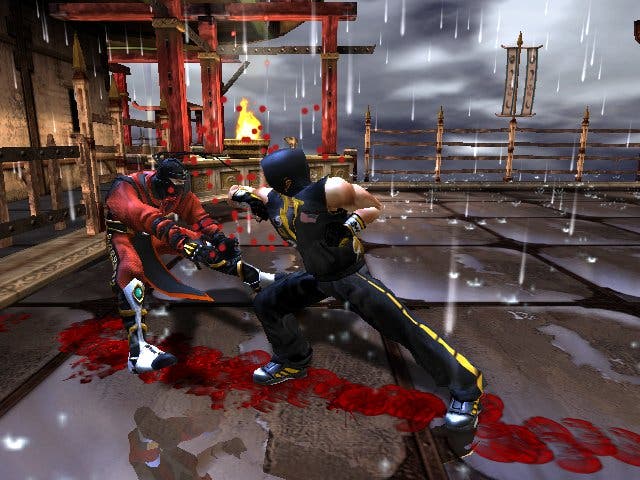
If anyone had doubts about the triumphant revival of Liu Kang, Scorpion, Baraka and their angry friends, then Deception impales those doubts on a sharp stick of improvement. While the core combat engine hasn't changed dramatically, the addition of online play and the highly improved Konquest mode make this a very attractive package.
The real reason for the name Deception actually refers to the collapse of last year's 'deadly alliance' between Quan Chi and Shang Tsung, after they defeat my old favourite, the thunder god Raiden. However, as soon as they turn on each other, a new threat arrives in the form of the Dragon King Onaga, the true ruler of Outworld. This guy is basically a slightly more dignified version of Goro from the original Mortal Kombat, and he becomes the focus of the game's arcade mode.
For anyone who missed Deadly Alliance, here's the rundown on what it did for the series. The original MK was slightly unwieldy, but some people felt that was half its charm. The sense of connection you got with an uppercut or a jump-kick was very satisfying, even if other fighting games felt a lot smoother. Deadly Alliance (and likewise Deception) has that same sense of clunky satisfaction, but with much more depth. Each fighter has three fighting styles, including a weapon stance, which can be switched on the fly during matches. Like most modern beat-'em-ups, you can sidestep around your opponent and each character has a plethora of combos and special moves to string together. The overall effect is less like the 'dancing' of Soul Calibur II and more like a compromise between the Mortal Kombat of old and current-gen games.
Making A Break For It
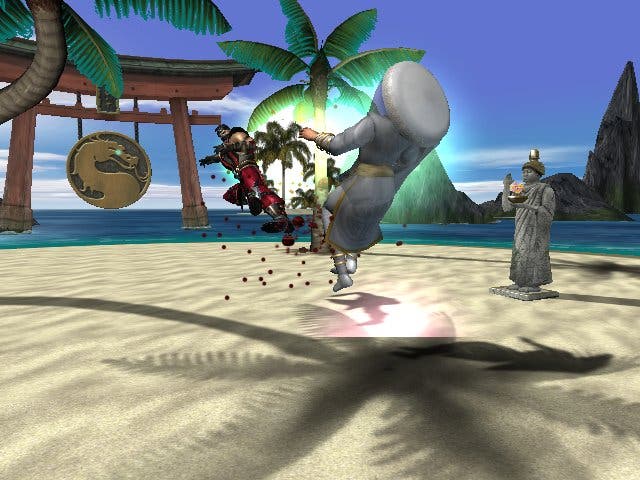
Whether you'll enjoy this depends on two things, really. Firstly, ask yourself how much you enjoy the now comical fatalities and violence in these games. If the answer is "a lot, actually... grrr", then you're on a winner. Secondly, ask yourself how much you enjoy pressing buttons. Lots and lots of times. Because this is one fighting system that really isn't much fun until you learn off long lists of combos. In the single-player mode you can get away with a limited repertoire of tricks (well, to a point anyway) but against a decent human opponent you'll need to be familiar with your chosen character's three stances and a variety of 'juggling' moves. My fingers hate having to press a sequence of six buttons in the space of three seconds, but that's what Deception requires sometimes. Whether this is the best way to recreate the feeling of 'battle' or not is another argument.
In Deadly Alliance, the strategic element of fights was basically limited to flinging combos at your opponent and hoping to guess correctly and defend his. This time around, however, there are a couple of new additions that change things a bit. The first are the 'Breaks', which allow you to stop an opponent's combo attack in mid-flight. These breaks make a lot of sense considering the game has now gone online, but you'll only have a limited number of them to use during a fight, so they won't stave off every attack. You execute a Break by simply pressing the right trigger (for defend) and pushing towards an opponent, so they're easy to do in a tight situation.
Another new element is the 'arena fatality' option. A bit like knocking a fighter out of the ring in Soul Calibur II, I found these fatalities extremely annoying, but they certainly add that extra bit of tension to proceedings. Thankfully, they can be turned off.
Shen Mue, Brutus
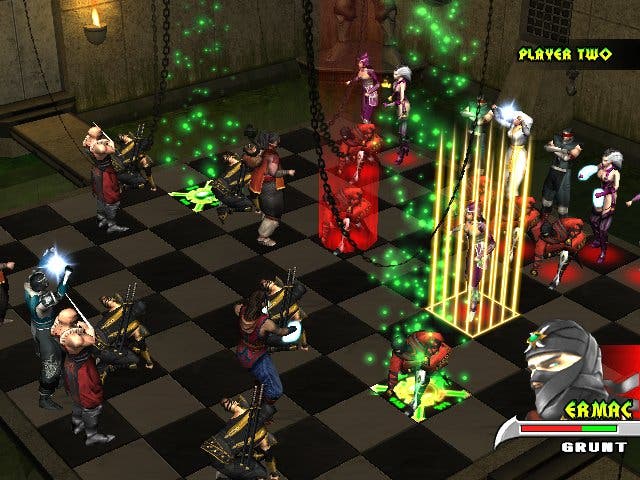
A far less annoying aspect of Deception is the excellent Konquest mode. This is essentially an adventure game in the Mortal Kombat universe, which initially serves as a tutorial and then fleshes out into the equivalent of an extensive story mode. While it certainly won't be striking fear into the hearts of Bioware, I was extremely surprised at how much fun this aspect of the game was. It amounts to you playing as one of the characters, Shujinko, from his beginnings in the Earthrealm village to his becoming the saviour of the land. The plot is terrible, the graphics are poor and the voice acting is more like play-acting... but Konquest is bloody addictive regardless. It plays much like any other third-person adventure game, with the right stick used for rotating the camera, except it doesn't bother trying to create much of an atmosphere for players. Instead, it focuses on one thing only: collecting Koins and keys, which can then be used to unlock literally hundreds of extras for the main game, including new characters, costumes and (you guessed it) production art. So while the NPCs only spout one or two lines, almost every one of them has a simple 'fetch' quest for you to perform. Likewise, while the buildings are just empty shacks, most contain Koins of various colours for you to unlock the extra 'Kontent' with. There's almost nothing superfluous about it.
Konquest is just a foil for the main game, and as such it doesn't really take itself seriously. As a result, there are some lovely touches that make it much more comfortable than the usual third-person adventure. For one thing (and this is essential) you can hold down the right trigger to run at an inordinate speed, which makes travelling much less frustrating. Another nice touch is the ability to punch all NPCs, which is always satisfying when you're in a bad mood. Even more pleasing, however, is the ability to speed up time - which is sometimes necessary for quests, because Konquest has a built-in day and night cycle. To sum it up, this is comparable to a watered-down Shenmue that kleptomaniacs might find as bizarrely compelling as the main game.
Checkmate? Check! Eh?
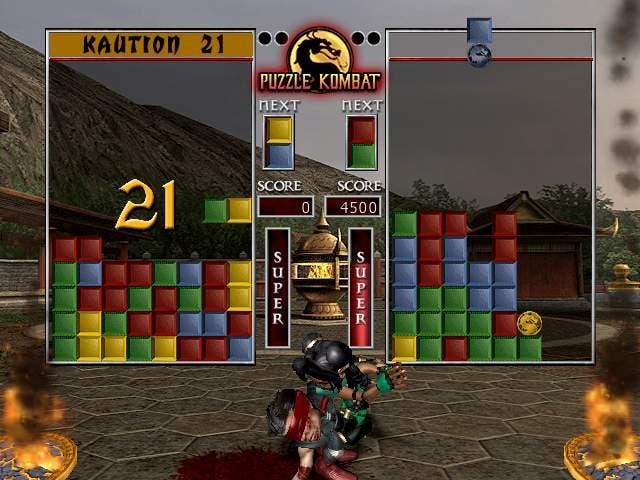
Just as brilliant are Deception's two 'puzzle' modes. One is a Tetris game that, aesthetically at least, bears a very strong resemblance to Super Puzzle Fighter II, with super-deformed MK fighters exchanging blows depending on how you match up coloured blocks. This isn't very deep, but in two-player mode it's a lovely distraction from the main event.
The other puzzle mode is a form of chess, which is played with MK characters that you choose from the start. When these pieces meet on the chessboard, you have to battle in order to see who takes the square. Attacking pieces are given health advantages over defending pieces, but how good you are at the main game can still have a big impact on the outcome of these events. Again, this is well implemented and a great alternative to the game's arcade mode. It's refreshing to see developers putting real effort into a beat-'em-up's extra modes, rather than throwing together the boring Time Attack and Team Battle options.
Of course, the truly excellent side to these mini-games, and the arcade mode itself, is the addition of online play. While I didn't get as much time to test this as I'd have liked, the matches I did play on Xbox Live were, for the most part, impressively lag-free. One did seem a little slow in responding to my commands, but it was the exception. The only downside to online play is the straightforward nature of it; basically it just amounts to individual matches, chess or puzzle kombat against another player, but at least it's technically sound.
Do Mine Eyes Deceive me?
Mortal Kombat: Deception and its predecessor have revived a series that was dying on its feet. Deadly Alliance gave us a solid, satisfying new engine with which to enjoy its hilariously macabre world. Deception throws in an extremely polished Konquest mode, the fun Chess and Tetris modes, plus online play. Of course, there are also a few new characters to unlock, plus a bunch of extra fatalities too.
If you enjoy fast-paced, button-tapping fighting systems, then this game represents excellent value for money. In saying that, it's still no comparison to the sublime Soul Calibur II, or even Virtua Fighter 4. Deception is a worthy addition to the genre, made all the better by some great extras. Whether the core engine is good enough to warrant a third game is unlikely, but there's no arguing Deception is a welcome sequel. And that's a good thing too - because, in the end, there's no deceiving the fans.

